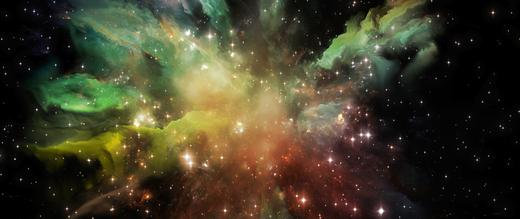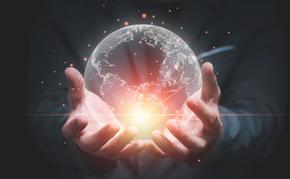The views expressed in our content reflect individual perspectives and do not represent the authoritative views of the Baha'i Faith.
As a Persian Poet has written: — “The Celestial Universe is so formed that the under world reflects the upper world.” That is to say whatever exists in heaven is reflected in this phenomenal world. – Abdu’l-Baha, Abdu’l-Baha in London, p. 45.
Has the universe always existed, or does it have a beginning?
I’ll answer that question with another question: have you ever heard of a Belgian Catholic priest, astronomer and physicist named Georges Henri Joseph Édouard Lemaître?
No? Me neither, until I began to research this series of articles on the immensity of the universe. It turns out that Father Lemaître, who passed away in 1966, first proposed the concept of the Big Bang, otherwise known as the theory of the expansion of the universe. His theory has now become the prevailing scientifically- and publicly-accepted model of cosmological time and creation.
While teaching physics at the Catholic University of Leuven in Belgium, Lemaître made the initial estimation, in 1927, of what science now calls the Hubble Constant—the rate of acceleration of all of the objects in the known universe. Edwin Hubble, the famous American astronomer, confirmed Lemaître’s theory two years later. Hubble often gets credit for the discovery, but Lemaître actually got there first, when he concluded that the entire universe was once a singularity—one ultra-massive point, extremely dense and super-heated, that then expanded into infinity.
Few scientists accepted the concept of the Big Bang at first. Rather than an expanding universe, most believed in a finite-size, steady-state, static universe, especially influential physicists like Albert Einstein. Einstein said to Lemaître, “Your calculations are correct, but your physics is atrocious.” Even the popular name of the theory (which Lemaître himself first called the “hypothesis of the primeval atom”), came from a BBC radio broadcast in 1931, when the English astronomer Fred Hoyle sarcastically referred to the idea as “The Big Bang.” The name stuck, and we now say it without any sarcasm at all.
(You may be interested to know that Einstein, to his credit, later called his static universe theory his biggest mistake. In 1931 he made a special trip to the Mount Wilson Observatory in California to thank Edwin Hubble for revolutionizing our modern understanding of the universe. Two years later, Einstein and Lemaître traveled to California on a speaking tour, and Einstein famously said “This is the most beautiful and satisfactory explanation of creation to which I have ever listened.”)
Today, many people agree, and firmly believe in the concept of the Big Bang—that the universe began 13.8 billion years ago with a colossal burst of matter and energy. Just about every contemporary physics text treats Lemaître’s theory as accepted science. However—and this illustrates the limitations of our scientific knowledge—physicists know that every concept regarding the cosmogony of the very early universe is just a wild guess. That’s because the laws of physics didn’t apply at the moment of creation, if there was one. Beyond that essential problem, we have no real proof of how the universe formed, or even if it did, because we have no way to test the theory of the Big Bang.
The Baha’i teachings—which support the essential agreement of science and religion as a primary principle—give us another viewpoint, one that correlates remarkably well with the newest scientific findings:
The universe has never had a beginning. From the point of view of essence it transforms itself. God is eternal in essence and in time. He is his own existence and cause. This is why the material world is eternal in essence, for the power of God is eternal. – Abdu’l-Baha, Divine Philosophy, p. 107.
Some scientists, the famous physicist Roger Penrose among them, have theorized that another universe existed before this one, and that the Big Bang was one of possibly many formative events. Others have concluded that no Big Bang ever occurred, and that the universe has no actual beginning. Recently, physicists Ahmed Farag Ali and coauthor Saurya Das at the University of Lethbridge in Alberta, Canada, wrote in the journal Physics Letters B that their new model of quantum relativity shows the universe has no beginning and no end.
Hard to imagine? The Baha’i teachings proclaimed it more than a century ago:
Baha’u’llah says, “The universe hath neither beginning nor ending.” He has set aside the elaborate theories and exhaustive opinions of scientists and material philosophers by the simple statement, “There is no beginning, no ending.” The theologians and religionists advance plausible proofs that the creation of the universe dates back six thousand years; the scientists bring forth indisputable facts and say, “No! These evidences indicate ten, twenty, fifty thousand years ago,” etc. There are endless discussions pro and con. Baha’u’llah sets aside these discussions by one word and statement. He says, “The divine sovereignty hath no beginning and no ending.” By this announcement and its demonstration He has established a standard of agreement among those who reflect upon this question of divine sovereignty; He has brought reconciliation and peace in this war of opinion and discussion.
Briefly, there were many universal cycles preceding this one in which we are living. They were consummated, completed and their traces obliterated. The divine and creative purpose in them was the evolution of spiritual man, just as it is in this cycle. The circle of existence is the same circle; it returns. The tree of life has ever borne the same heavenly fruit. – Abdu’l-Baha, The Promulgation of Universal Peace, p. 220.
If our universe has no beginning and no end, what does that mean for our concept of a Creator and a creation? We’ll look into that fascinating, mind-boggling question in the next essay in this series.
Next: Do You Believe in Creation or Eternity?
You May Also Like
Comments

















What If the universe was created for us.
Maybe we made the universe. Or we were here all the time.
No beginning and no ending.
What if humanity was here all the time but just moved around the universe or universes.
Maybe the universe had a beginning. Maybe we just think it had a beginning because in this world everything has a beginning and end.
As the energy is not created, neither destroyed, but only transformed, the Big Bang theory explains only how the energy was transformed to start our universe.
For me, there is no link between the theory of Big Bang and the eternal creation. And off course, they are not contradictory.
As science pushes its understanding of creation closer to the Big Bang, at each step creation becomes more awesome. Perhaps one day science can reach back before the Big Bang, perhaps not. If it cannot, it will be another reminder that we cannot ever understand everything about reality or about God.